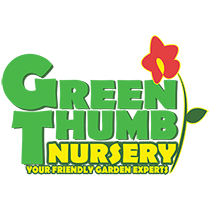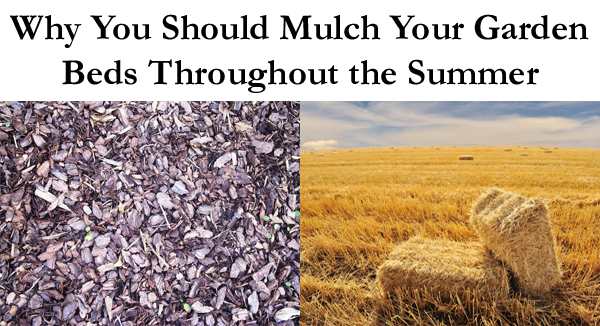Newsletter Articles
Why You Should Mulch Your Garden Beds Throughout the Summer
Written by Susan B.
Have you ever wondered why the landscaped areas and trees in your neighborhood are covered in a layer of shredded bark, compost, or organic mulch? It does a lot to enhance the aesthetic appeal of the property, but that’s not one of the main reasons for applying mulch. We’re going to discuss the benefits you get from using mulch. We’re also going to talk about the types of organic mulch products you may want to consider, and what products you should avoid and why.
What is Mulch?
Mulch is any substance – whether organic or inorganic that covers the soil to help it hold moisture in, maintain consistent soil temperature, suppress weed growth. Mulch can also improve the overall appearance of your flower beds, vegetable garden, and border areas in front of shrubs, or the area around trees.
Types of Mulch
There are two types of mulch: organic and inorganic. Both organic and inorganic mulch products can help suppress weed growth, but they won’t eliminate them altogether. The presence of soil microorganisms assists the breakdown and decomposition of organic mulch materials. The decomposed organic matter adds valuable nutrients to the soil. It also enhances drainage and airflow and breaks up compacted soil particles.
Organic mulches include materials like coconut husks (shredded), chopped or shredded leaves, compost, grass clippings, paper, pine needles, sawdust, seed, and weed-free hay, shredded bark, and straw.
Inorganic mulches include fabric (landscape fabric), mesh, and plastic, and stone or gravel.
Organic Mulch Materials
Wood Chips and Shredded Bark
Most garden centers sell wood chips and shredded bark mulch. Shredded wood (or sawdust) breaks down faster than wood chips do. Shredded wood mulch is better suited to use in vegetable gardens and flower beds because it breaks down more quickly than wood chips and because shredded wood won’t jam a tiller.
Shredded wood will help suppress weeds, moderate the soil temperature, and help hold moisture in and keep your vegetable and flower garden beds looking neat and well-kept.
Grass Clippings
When you mow the lawn, you can attach a grass catcher to the back. Leave some of the grass clippings on the lawn to act as a naturally nitrogen-rich fertilizer. The high nitrogen content of grass clippings makes it an ideal mulch to use on your vegetable garden beds.
Compost
Compost is always an excellent mulch because it’s also an ideal soil additive. Mulch is already broken down, and it will add nutrients to your soil. It also improves soil quality by breaking up compacted particles, improving water retention, and allowing air to circulate around plant roots.
If your compost is too dry, it won’t create or enhance the healthy environment you want for your plants. It is best to apply a thin layer of dry mulch (like ½-inch or less) and then cover it with some other organic mulch substance.
Hay or Straw
Salt hay, straw, or weed-free are the best option for veggie gardens. They enhance the appearance by making the area look tidier. These materials are most helpful for aiding in maintaining soil moisture, inhibiting weed growth, and adding valuable organic matter.
If you want to use hay, be sure you use seed-and-weed-free hay. Also, keep the hay away from the trunks of fruit trees, and the stems of vegetable plants to prevent potential rodent and slug damage.
Inorganic Mulch
Black Plastic Mulch
Black plastic film is especially useful for vegetable and fruit gardens. You will want to spread it over level soil, securing it tightly before you transplant seedlings or starter plants. You’ll have to cut slits or holes in the plastic for your plants. The benefit of black plastic is that it creates a warm environment in the soil under it. The temperature difference between a plastic-covered vegetable garden and an unmulched one may not be significant. But the fact that the film creates a warmer and dryer atmosphere will benefit food crops that grow on vines along the ground. That includes strawberries, melons, pumpkins, squash, and cucumbers, to name a few. Plastic aids in moisture retention and suppresses weed growth, but it doesn’t do anything to improve the overall quality of your garden soil.
Landscape Fabric
Landscape fabric allows plants to get air and water while suppressing weeds. But there is a disadvantage because the fabric degrades from daily exposure to the sun. On top of that, the fabric isn’t very attractive, so you may want to cover the fabric with some other mulch material. Landscape fabric can’t improve the overall quality of your soil. Another consideration is the fact that you need to keep the landscape fabric away from trees or shrub trunks. The fabric cannot prevent weeds or shrub roots from growing up through the material. That means you’ll have to tear the fabric to get to the weeds and extraneous surface roots so you can remove them.
The best reason to use organic mulch is because of the benefit it provides to your soil – and that benefit lasts for as long as three years. In urban areas (like ours), soil compaction is a severe problem. Professional landscaping services often drive over your landscape with their mowers. Edgers and weed whackers disrupt border soil, and the more often the soil is flattened or turned over, the more compacted it gets. Compaction prevents air from circulating around the plant roots. It also makes it virtually impossible for water to reach the roots, and to stay in the soil, so you don’t have to water as often.
Our team of garden experts is always available to help you choose mulch products that will produce the most significant benefits for your garden, your soil, and save you from having to do a lot of back-breaking work throughout the summer.
Do you like what you see? Sign up for our weekly newsletter to get content like this every week!

